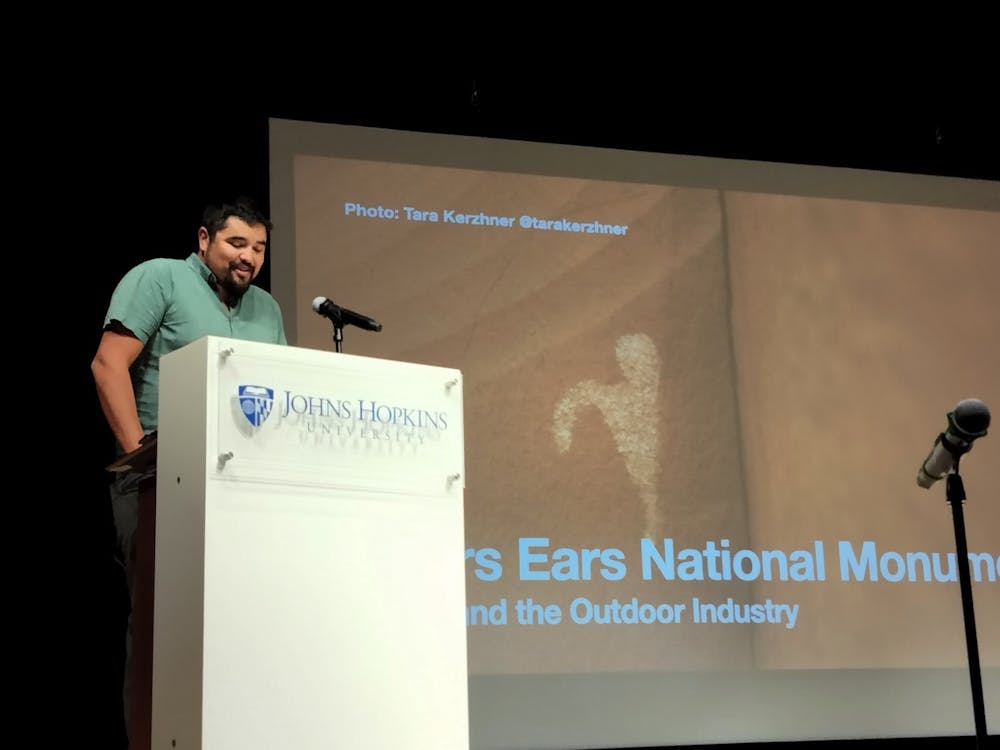In the Milton S. Eisenhower (MSE) Symposium’s final event on Nov. 16, Len Necefer discussed his current efforts to advocate for the protection of land and the cultural empowerment of Indigeneous people. Necefer, a member of the Navajo Nation, is a climate activist, former University of Arizona Public Policy professor and the CEO and founder of NativesOutdoors.
In an interview with The News-Letter, junior Joshua Deck, the co-chair of programming for MSE, stated that the organizers wanted to focus on contemporary issues and events that define the current generation for the Symposium's last talk.
“We knew that we wanted to bring in a speaker who could testify to that and provide more information on what we, as common students, will be recokining with for the rest of our lives,“ he said.
Necefer began the event by providing an overview of the current geographical distribution of American Indian reservations.
He explained that reservations are still owned by the U.S. government and that most U.S. federal public land exists in the Western United States and Alaska.
“We have to take a step out and look at where these lands came from, [as the] U.S. federal public land system was the result of forced removal and genocide by the federal government,” he said.
Necefer then recounted spending time with his grandfather at Bears Ears National Monument when he was young. The monument is a large area of protected land that multiple tribes have called home for over 20,000 years. The tribes formed inter-tribal organizations to combat the increasing threats of oil and gas development and other extractive industries.
Necefer highlighted the monument’s significance.
“The Bears Ears today is representative of the tribes that represent the tribal coalition,” he said. “And part of this was coming from the understanding that tribes are sovereign nations, and we represent a unique, third sphere at the top of sovereignty within the United States.”
To protect the Bears Ears National Monument, Necefer and his friends ran a 250-mile relay across Bears Ears and Grand Staircase-Escalante. They documented the experience in a short film titled “MESSENGERS - A Running Story of Bears Ears & Grand Staircase-Escalante.” Necefer added that the run and film helped raise awareness and money to support the tribal coalition.
Necefer relayed how he and his friends began campaigning with outdoor recreational companies to support the tribal coalition. He emphasized that his work places importance on the preservation of Indigenous cultures and design.
“We've been able to partner with a number of companies to hire Indigenous artists and ensure that these products end up benefiting native communities directly,” he said. “There was a component of supporting Native artists, important projects and working with the native communities.”
In an interview with The News-Letter, freshman Maxwell Rho noted what he learned from Necefer’s talk.
“What I found very interesting was the outdoor rec industry's role [in helping] promote these stories and identities,” he said. “I learned about the challenges and struggles these people, these communities go through and how they must adapt in this modern world.”
Looking to the future, Necefer described his goals of building connections across the outdoor recreational industry. By lobbying to bring in famous climbers and advocacy organizations, he hopes that they will work with tribes to help protect both Indigenous people and outdoor recreation.
He concluded that it is important to be aware of the necessity of collaboration.
“Part of our work is to tell those stories and to ensure that native peoples and Indigenous peoples have a section where our work is kind of multifaceted,” he said. “So part of our time... out there is educating the common but also to understand how to better work together on this issue.”
Senior Rohit Sivananthan described his takeaways from Necefer’s talk in an interview with The News-Letter.
“As we progress in science and environmental management, I think we're really bringing things that Indigenous communities have known for a while,“ he said. “We're realizing that these perspectives are important, and I am always happy to hear from a speaker who's giving power to these perspectives.”





